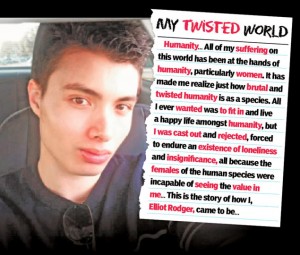This blog was originally posted at SamLouieMFT.com and is reprinted here with the permission of the author.
It’s peculiar as an Asian American psychotherapist and former journalist to watch how issues of violence and race are covered and reported by the media. An example of this is the news reporting of the carnage committed by 22 year old Elliot Rodger on Isla Vista near Santa Barbara where Rodger killed six people before killing himself. The media depicts him as a young, white psychopath with mental health issues who had a fixation and deep hatred of beautiful white, blonde women, especially those from sororities.
Yet, what has been lost is Rodger’s own mixed-heritage as the child of a Chinese mother and British father. The media downplays race when it wants to but highlights it when it’s to their advantage. In mainstream media, it will be hard to find reports that detail his feelings of racial ostracism and the impact it had on his feelings toward other minorities. Keep in mind, this was a guy who had significant venom towards Blacks and other Asians who were able to have white girlfriends. Part of his animosity is due to his feelings of inferiority of not being “good enough” as someone with mixed-race.
The media incorrectly describes Rodger in many broadcast and print stories as White. Similar to the media’s description of George Zimmerman as “white”, issues of bi-racial individuals are contorted to the image the media wants the portray to the public. If Rodger was half-Black, you can be sure the media would find a way to highlight his darker side and castigate him along racial lines.
So why the media misrepresentation of race? I believe part of this is unconscious and unintentional because of the lens from which newsrooms view the world. In most studies, nearly ninety-percent of news room management and executives are white men from middle to upper-class backgrounds. With a lack of diversity (both ethnic and socio-economic status) in the newsroom, they see things from their cultural lens. That’s not inherently right or wrong, it just is. But we as a community, as viewers and consumers of news, can and should demand more. I’m not advocating simply diversity for diversity’s sake but for management to acknowledge and recognize an aspect to life that they may have overlooked-white privilege. One aspect of white privilege is seeing life from your prism without the ability to recognize there are other views that are equally valid.
In Rodger’s case, white newsrooms see a “white” man even when the facts say otherwise. But as an Asian American, I could never see Rodger as “white” since he is half-Chinese and shared extensively in his writing about his inability to find comfort in his ethnic identity. As Asian Americans, we would never deny his ethnicity or see past it. It may not reflect well on us as a community because of his atrocious crime but for us to dismiss his heritage would be similar to turning a blind eye to what’s most obvious to us-his ethnic make-up.
As Asian Americans, we will focus more on the role of race and its impact on his mental health leading up to the crime. What I’m directly referring to is his lack of identification not with white society and white women per se (even though that’s what he focuses on in is writing) but his challenges to assimilate into an Asian American community. Rodger never found acceptance in white America and that much we know is true, but I also wonder if mental health therapists or other pundits realized how much difficulty he had in finding acceptance among Asian-American circles.
While the white media will focus on mental illness, label and dismiss Rodger as a “psycho”, or clamor for gun control, we as Asian-Americans will continue to wonder if this could have been prevented if there was a larger Asian community that could’ve embraced him as one of his own.



RE: Elliott Rodger story is being framed through lens of white media: i’ve read parts of his journal (sorry, just parts for now) and he’s ashamed of being asian. he’s probably even ashamed of how his mother looks like (i haven’t seen a picture of her). he’s very status-conscious too. he loved the thought of being rich and people acknowledging that he’s rich, he loved the thought of everyone especially men looking up to him because he’s rich and got a hot, blond girlfriend/s . the ‘hot, blond girl’ is not a person for him, it’s someone you display to other men especially. of course when that ‘hot girl’ ends up fat later in life, it’s right to just leave her. she’s not useful to him anymore. of course, men’s views are far more important than women’s views for him.
he truly bought into all this materialistic, misogynistic and racist crap that’s floating around. i don’t even think he would have wanted to have full asian friends, because they don’t look white enough and are therefore “ugly”.
RE: Elliott Rogers story is being framed through the lens of White media: Asian Americans are the whiniest people I’ve ever come across. Whenever there’s something out there in the media, they WANT their race to be mentioned, even in cases like this where it’s about a MURDERER. Are you people that insecure?
What, you want to say, hey Fox news, CNN, etc, look at us, Asians can do mass shooting too, ya know? Asian Americans are ridiculously annoying.
RE: Elliot Rodger story is being framed through the lens of White Media: Ridiculous story…. One of which I feel race has really no place in. He was a self pitting loser that lost his marbles and killed as many people as he could before killing himself. PERIOD.